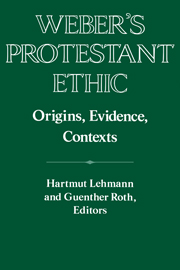Book contents
- Frontmatter
- Introduction
- Part I Background and Context
- Part II Reception and Response
- 10 The Longevity of the Thesis: A Critique of the Critics
- 11 The Use and Abuse of Textual Data
- 12 Biographical Evidence on Predestination, Covenant, and Special Providence
- 13 The Thing that Would Not Die: Notes on Refutation
- 14 Historical Viability, Sociological Significance, and Personal Judgment
- 15 The Historiography of Continental Calvinism
- 16 The Protestant Ethic and the Reality of Capitalism in Colonial America
- 17 The Economic Ethics of the World Religions
- 18 “Meet Me in St. Louis”: Troeltsch and Weber in America
- Index
12 - Biographical Evidence on Predestination, Covenant, and Special Providence
Published online by Cambridge University Press: 05 January 2013
- Frontmatter
- Introduction
- Part I Background and Context
- Part II Reception and Response
- 10 The Longevity of the Thesis: A Critique of the Critics
- 11 The Use and Abuse of Textual Data
- 12 Biographical Evidence on Predestination, Covenant, and Special Providence
- 13 The Thing that Would Not Die: Notes on Refutation
- 14 Historical Viability, Sociological Significance, and Personal Judgment
- 15 The Historiography of Continental Calvinism
- 16 The Protestant Ethic and the Reality of Capitalism in Colonial America
- 17 The Economic Ethics of the World Religions
- 18 “Meet Me in St. Louis”: Troeltsch and Weber in America
- Index
Summary
Professor MacKinnon's analysis of Max Weber's interpretation of seventeenth-century English Calvinism is a wholesale rebuttal of Weber's method and conclusions. There are in the main two pillars on which this rebuttal rests. First, there is the claim that the impact of covenant theology and its reception in England during the initial decades of the seventeenth century seriously weakened and ultimately even destroyed the hold of the doctrine of predestination on English Protestants. The second pillar is the criticism that Weber made Richard Baxter, a pastoral theologian who clearly relativized predestinarian teaching, the main witness of his thesis that Puritan predestinarianism, through the individual anxiety that it created, brought forth and engendered forms of inner-worldly asceticism.
To take the case of Richard Baxter first: He was obviously not a predestinarian theologian, and to that extent, Weber's use of Baxter and of his prominent pastoral work, The Christian Directory, was indeed not at all well chosen. In this respect, I think that MacKinnon has a point, although it is not an entirely new one. However, unlike MacKinnon, I do not think that Baxter's opposition to the “Antinomians,” by which he chiefly meant the so-called Civil War Sects, had anything to do with his rejection of the predestinarianism of the Westminster confession.
- Type
- Chapter
- Information
- Weber's Protestant EthicOrigins, Evidence, Contexts, pp. 273 - 284Publisher: Cambridge University PressPrint publication year: 1993
- 2
- Cited by

